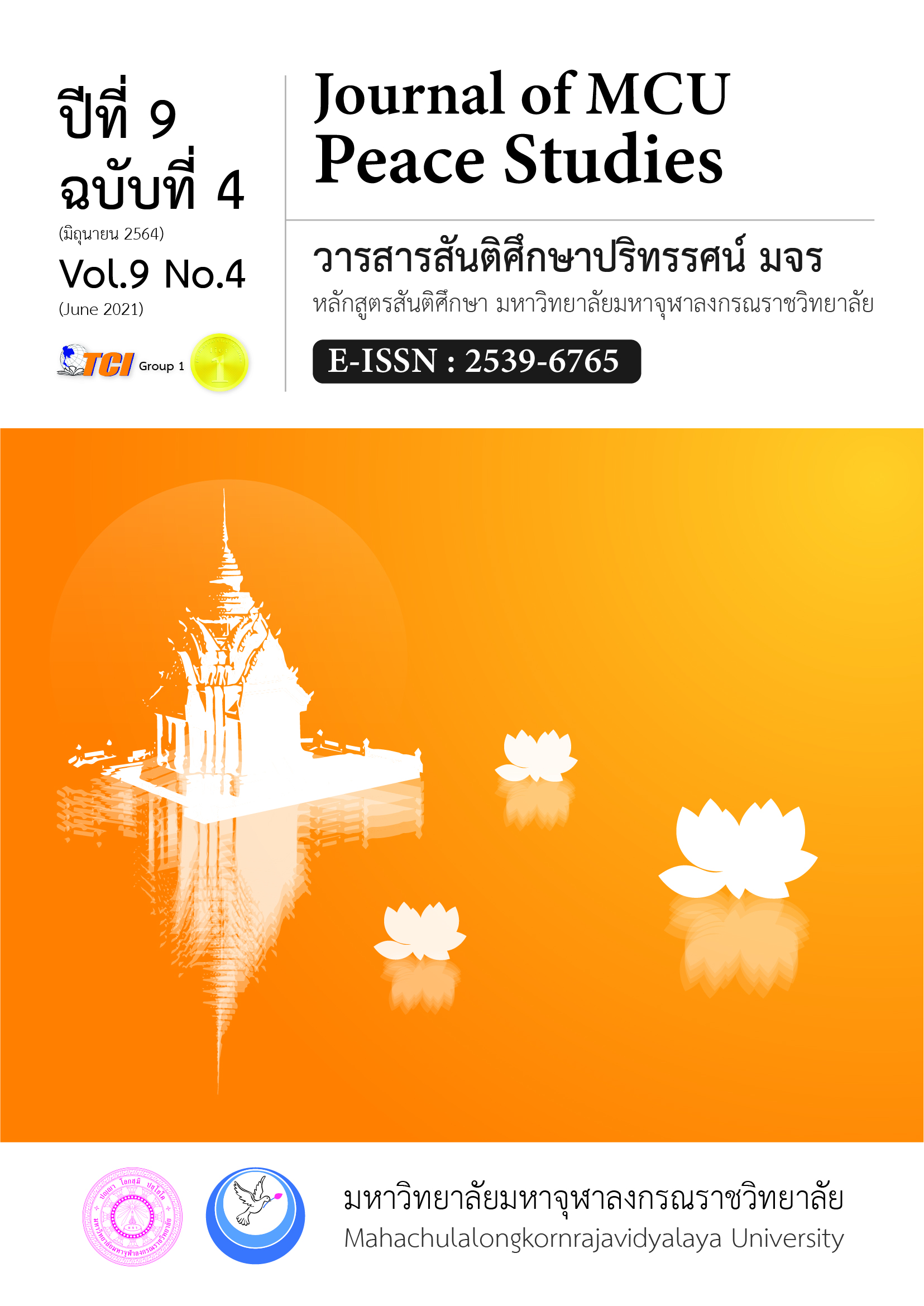รูปแบบการบริหารจัดการสถานศึกษา รางวัลคุณภาพแห่งชาติเชิงพุทธ สังกัดสำนักงานเขตพื้นที่การศึกษามัธยมศึกษา เขต 42
Main Article Content
บทคัดย่อ
บทความวิจัยครั้งนี้มีวัตถุประสงค์ 1) เพื่อศึกษาสภาพการบริการจัดการสถานศึกษา 2) เพื่อสร้างรูปแบบการบริหารจัดการสถานศึกษา รางวัลคุณภาพแห่งชาติเชิงพุทธ 3) เพื่อประเมินรูปแบบการบริหารจัดการสถานศึกษารางวัลคุณภาพแห่งชาติเชิงพุทธ การวิจัยนี้เป็นการวิจัยแบบเชิงปริมาณและเชิงคุณภาพ แบ่งออกเป็น 3 ขั้นตอน คือ ขั้นตอนที่ 1 ศึกษาสภาพการบริการจัดการสถานศึกษา ผู้ให้ข้อมูลสำคัญ จำนวน 15 คน ใช้แบบสัมภาษณ์กึ่งโครงสร้าง และใช้การวิเคราะห์เนื้อหา ขั้นตอนที่ 2 สร้างรูปแบบการบริหารจัดการสถานศึกษา รางวัลคุณภาพแห่งชาติเชิงพุทธ ผู้ให้ข้อมูลสำคัญ จำนวน 11 รูป/คน 1.ผู้เชี่ยวชาญด้านพระพุทธศาสนาจำนวน 2 รูป/คน 2.ผู้เชี่ยวชาญด้านรูปแบบ จำนวน 2 คน คือ ผู้บริหารการศึกษาหรือผู้บริหารอุดมศึกษา/มีความรู้ระดับปริญญาเอก 3. ผู้เชี่ยวชาญด้านบริหารการศึกษา จำนวน 6 คน ผู้บริหารการศึกษาและผู้บริหารสถานศึกษามัธยมศึกษา/ระดับผู้อำนวยการชำนาญการพิเศษ โดยการจัดสนทนากลุ่ม เครื่องมือที่ใช้ ร่างรูปแบบการบริหารจัดการสถานศึกษารางวัลคุณภาพแห่งชาติเชิงพุทธ แบบบันทึกการสนทนากลุ่มและใช้การวิเคราะห์เนื้อหา ขั้นตอนที่ 3 ประเมินรูปแบบการบริหารจัดการสถานศึกษา รางวัลคุณภาพแห่งชาติเชิงพุทธ ผู้ให้ข้อมูลจำนวน 15 คน เครื่องมือที่ใช้ในการวิจัย คือ แบบประเมินที่ประกอบด้วย 4 ด้าน คือ ประเมินความถูกต้อง ความเหมาะสม ความเป็นไปได้ในการปฏิบัติ และความเป็นประโยชน์ สถิติที่ใช้ได้แก่ค่าเฉลี่ยและค่าเบี่ยงเบนมาตรฐาน ผลการวิจัยพบว่า 1) ผลการศึกษาสภาพการบริการจัดการสถานศึกษา มีทั้งหมด 7 ด้าน คือ 1.ด้านการนำองค์กร 2.ด้านกลยุทธ์ 3.ด้านนักเรียนและผู้มีส่วนได้ส่วนเสีย 4.การวัด การวิเคราะห์ และจัดการความรู้5.บุคลากร 6.ด้านการปฎิบัติการ 7.ด้านผลลัพล์ 2) ผลการสร้างรูปแบบการบริหารจัดการสถานศึกษา รางวัลคุณภาพแห่งชาติเชิงพุทธ พบว่า ทั้ง 7 ด้านที่บูรณาการหลักทุติยปาปณิกสูตร มี 78 วิธีการ 3) ผลการ ประเมินรูปแบบการบริหารจัดการสถานศึกษา รางวัลคุณภาพแห่งชาติเชิงพุทธ สังกัดสำนักงานเขตพื้นที่การศึกษามัธยมศึกษา เขต 42 ในภาพรวมอยู่ในระดับ มากที่สุด
Article Details
ทัศนะและความคิดเห็นที่ปรากฏในบทความในวารสาร ถือเป็นความรับผิดชอบของผู้เขียนบทความนั้น และไม่ถือเป็นทัศนะและความรับผิดชอบของกองบรรณาธิการ ยินยอมว่าบทความเป็นลิขสิทธิ์ของวารสาร
เอกสารอ้างอิง
Bennette, J., & O'Brien, M. (1994). The building blocks of the learning Organization. Training, 31(6), 41-49.
Gary, Y., & Tracey, J. (1997). Consequences of Influence Tactics Used with Subordinates. Peersand the Boss. Journal of Applied Psychology, 77(4), 525-535.
Gold, S. E. (2000). Community organization at a neighborhood high school: promises and dilemmas in building parent –educator partnership and collaboration. Proquest Digital Dissertation, 60 (7), 295.
Kinkade, D. A. (1996). Factors That Affect a School-based Management Team’s Ability to Make and implement Teaching and Learning. (Doctoral Dissertation). Harvard University. Cambridge, MA, USA.
Ingrid, P. (2001). Going global: Preparing our students for interconnected world. Dissertation Abstracts International.
Lauzon, N., & Begin, S. (2007). Developing a strategy to enhance school principal credibility, Teaching Leaders to Lead teachers: Educational Administration in the Era of Constant Crisis Advances in Educational Administration, 10.n.p.
Mahachulalongkornrajavidyalaya University. (1996). Thai Tripitakas. Bangkok: MCU Press.
Muenkota, R. (2014). Model of Strategic Planning in Changing Management of Secondary School Administrators in International School Project. (Doctoral Dissertation). University of Eastern Asia. Bangkok.
National Degree Enhancement Institute, Ministry of Industry. (2019). TQA Criteria for Performance Excellence Framework 2020 –2021, 1-9.n.p.
Office of the National Economic and Social Development Council (2019). GDP, fourth quarter of 2018Year 2018 and trends for 2019.
Phra Chinnawat Kingkaew. (2018). Development of the 5th Group Pariyatttham School Management Model To excellence. Eau Heritage Journal, 4(2), 162-170.
Phra Maha Suphot Sumetho. (2015). The Development of Effective Educational Administration Model Based on Buddha-Dhamma of General Education. Journal of Yanasangvorn Research Institute, 6(1), 9-24.
Supasopon, C. (2008). Development of academic administration model based on working principles asbasic school team. (Doctoral Dissertation). Chulalongkorn University.Bangkok.
Siriwal, D. (2014). Guidelines for implementing word-class standard school policy into practices in primary schools under the office of basic education commission. (Doctoral Dissertation). Kasetsart University. Bangkok.
Secondary Educational Service Area Office42, (2019). Basic Educational Quality Development Curriculum Documents organization and regulations for. (1st ). Nakhonsawan Secondary Educational Service Area Office42.
The Constitution of the Kingdom of Thailand. (2017). Government Gazette.
Tosikai, T. (2013). Strategic Leadership Development of Primary School Administrators in accordance with the Principles of Second Papani Sutta in Nakhon Sawan Primary Educational Service Area Office1. (Doctoral Dissertation). Mahachulalongkorn University. Ayutthaya.
Yildirim, A., Bastug, L. (2010). Teachers’ views about ethical leadership behaviors of primary school directors. Procedia Social and Behavioral Sciences, 2, 4109-4114.


